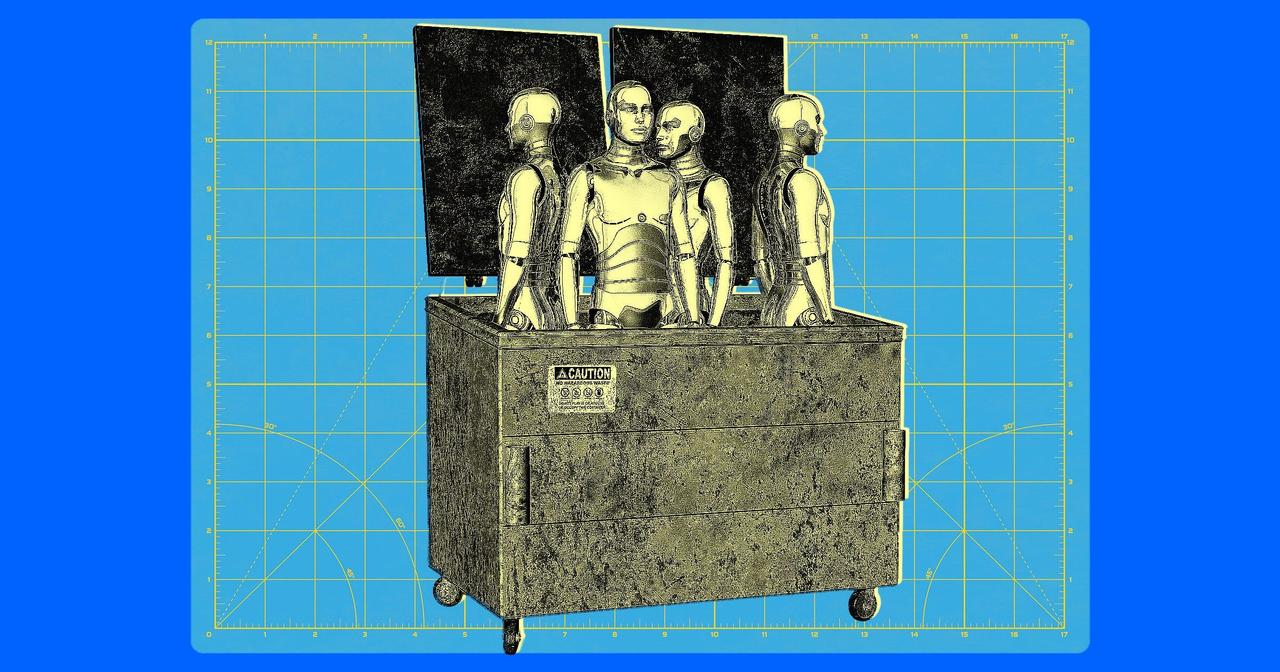AI Adoption Slows Among Large Companies, Raising Questions About Industry's Future
4 Sources
4 Sources
[1]
AI adoption rate is declining among large companies -- US Census Bureau claims fewer businesses are using AI tools
Reading the headlines and talking to its users, it's clear on some level that AI has taken over the world and maybe even ushered in a new epoch. From regular people to large-scale companies, everyone has seemingly jumped aboard the AI hype train -- so much so that it's created entirely new entities and bolstered existing ones beyond imagination. More and more people use services like ChatGPT for their daily routines now, and firms employ enterprise-grade AI tools to help with business, sometimes to the point of favoring it over human workers. But a new survey conducted by the U.S. Census Bureau and reported on by Apolloseems to show that large companies may be tapping the brakes on AI. Large companies (defined as having more than 250 employees) have reduced their AI usage, according to the data (click to expand the Tweet below). The slowdown started in June, when it was at roughly 13.5%, slipping to about 12% at the end of August. Most other lines, representing companies with fewer employees, are also at a decline, with some still increasing. Keep in mind that the survey is biweekly, which means it collects samples every two weeks, but the data isn't available at the same rate. Hence, there might be fluctuations in statistical accuracy, though other news on the AI front has been murky lately. Recently, Nvidia's share price dropped following its quarterly earnings call, where CEO Jensen Huang said its AI GPUs are sold out. Analysts have even begun warning of a potential "AI winter," which could impede AI hype further. The U.S. Census Bureau, a government agency that's been around since 1902, conducts its Business Trends and Outlooks Survey (BTOS) every two weeks. This survey is the primary method of determining AI use and adoption for businesses in the country, and its latest report shows a decline for the first time since tracking began in 2022. As of late 2023, only ~3.9% of companies had used AI to sell or produce their goods/services. That number rose to over 5% by mid-2024. This survey includes 1.2 million firms, so the data should be fairly reliable. Critics might point toward an initial overenthusiasm in adopting AI that has now led to a pullback. A recent Stanford study showed that AI was responsible for a 13% decline in jobs for young U.S. workers. A later Harvard study essentially corroborated that by revealing that junior-level roles are far more impacted than senior jobs due to AI. These numbers line up with the fact that firms were eager to embrace artificial intelligence early on to broaden their margins, which ended up reducing jobs without even cutting much of the cost. It's not just large companies, either. A survey of 1,500 businesses in June also showed AI adoption declining among smaller firms. However, the distinction between using AI tools to get work done and using AI as a stand-in for a worker is unclear. You still need someone present to control and manage the AI, essentially maximizing its potential. On the other hand, AI could be doing the job a worker could've done, which adds to the unemployment rate. We'll need to see more data over a longer period of time to make a definitive judgment about the state of the AI industry. AMD executives stated just this past weekend at IFA in Berlin that AI is "underhyped," and the hardware behind it is certainly making companies a lot of money. So there's still no shortage of positive takes on the future of this technology. But with recent indications of a pullback from companies big and small, it will be interesting to see how an industry that has benefited from a global hype cycle handles a reality where everything isn't trending up.
[2]
AI Use at Large Companies Is in Decline, Census Bureau Says
A dip in corporate AI adoption isn't a great sign for an industry hellbent on world domination. For the past few years, the AI industry has been charging full steam ahead, in what can sometimes feel like a pell-mell mad dash to take over the world. Ever since the launch of ChatGPT in 2022, the industry has leveraged an ever-expanding arsenal of political, cultural, and economic power in its effort to lay claim to many different parts of society. Yet, despite the AI industry's attempts to make itself seem omnipresent, a new report this week shows that adoption at large U.S. companies has declined. The report comes from the Census Bureau and shows that the rate of AI adoption by large companiesâ€"that is, firms with over 250 employeesâ€"has been declining slightly in recent weeks. The report is based on a biweekly survey, dubbed Business Trends and Outlook (or BTOS), of some 1.2 million U.S. firms. The survey, which asks businesses about their use of AI tools, such as machine learning and agents, found thatâ€"between June and nowâ€"the rate of adoption had declined from 14 to 12 percent. Futurism notes that this is the largest drop-off in the adoption rate since the survey first began in 2023, although the survey also showed a slight increase in AI use among smaller companies. The moderate drop off comes after the rate of adoption had climbed precipitously over the last few years. When the survey first began, in September of 2023, the AI adoption rate hovered around 3.7 percent, while the adoption rate in December 2024 was around 5.7 percent. In the second quarter of this year, the rate also rose significantly, climbing from 7.4 percent to 9.2. The new drop-off in reported usage comes not long after another study, this one published by MIT, found that a vast majority of corporate AI pilot programs had failed to produce any material benefit to the companies involved. While it's hard to tell much from the findings of two disparate reports, it certainly doesn't depict AI as the unstoppable force its proponents hope it is. It could even suggest that AI is less a vital corporate tool and more a trendy bauble that companies don't quite know what to do with. In other words, the ongoing chatter about AI being a bubble that is due to burst may have newfound relevance sooner rather than later.
[3]
As Hype Fades, AI Use Is Now Declining at Large Companies
Artificial intelligence might be booming on paper, but in the real world, there are signs of a major slowdown. In their latest biweekly survey of AI adoption, the US Census Bureau found evidence of an obvious drop-off in corporate AI use -- the largest since the survey began in November of 2023. The survey, which compiles data from over 1.2 million firms throughout the US, shows usage of AI tools among companies with over 250 employees dropping from nearly 14 percent in mid-June to under 12 percent in August. While usage appeared to rise slightly in very small businesses with less than four workers, AI adoption also fell or remained flat in mid-sized companies with less than 250 workers but more than 19. It's a particularly distressing sign for tech investors and CEOs, whose unfettered spending on AI is now literally holding up the US economy. For the last few years, they've held that enterprise AI -- stuff that would prop up powerful companies in tech, finance, and beyond -- was the key to building a sustainable business model off of AI development. For example in 2024, the CEO of software megacorp SAP Christian Klein enthused that enterprise AI "will indeed revolutionize how companies will run." As recently as June of this year, meanwhile, wealth management firm UBS issued a statement arguing that a "peak in overall AI adoption is still a long way off, and accelerating AI use is set to drive further monetization across industries." But if a corporate AI revolution is underway, it's not showing up in the data. Up to this point, enterprise AI has been incredibly unprofitable, with a whopping 95 percent of US companies that took up AI reporting that the software has failed to generate any sort of new revenue. Though tech stocks continue to break new records on AI hype, some financial onlookers are warning that the tech industry might never recoup its spending on AI, and that innovations around the software have hit a plateau. It's all adding up into a pretty disappointing summer for AI overall. In August, OpenAI's long awaited GPT-5 model, which was expected to show a massive improvement over previous AI releases, hit the net with a thud. Though it'd been expected to be a leap forward toward human-level artificial intelligence, the latest model performed worse on benchmark tests than its peers. In perhaps the most telling sign, companies that had previously laid off or stopped hiring flesh and blood workers are now scrambling to refill their ranks, realizing the tech is nowhere near as capable as the hype made it out to be. Unless enterprise AI can flip a switch and start earning its keep, the latest drop-off in AI usage could just be the start of a steep slope toward the bottom.
[4]
Is AI bubble about to burst? Zoho founder Sridhar Vembu says don't overhype adoption, 'good things take time
Despite the AI hype, corporate adoption appears to be slowing, with a US Census Bureau survey indicating a decline among larger companies. Tech giants are reportedly pulling back on major AI investments due to poor returns on pilot projects. Experts caution that investor enthusiasm may be outpacing reality, and the financial consequences of an AI slowdown could be significant. Despite the global buzz around artificial intelligence (AI) and concerns over mass job losses, new data suggests that corporate adoption of AI may actually be slowing down rather than accelerating. A report by Apollo Academy, citing a biweekly survey from the US Census Bureau, found that AI adoption has been declining among companies with over 250 employees. The survey, which covered around 1.2 million firms, looked into businesses using tools such as machine learning, natural language processing, virtual agents, and voice recognition to support production or services over the last two weeks. Sharing insights from the survey, Zoho founder Sridhar Vembu stressed the importance of patience in innovation. "Good things take time. We are investing heavily in R&D in various aspects of AI but we will not overhype it," Vembu said. Adding to the skepticism, Fortune recently reported that tech giants like Microsoft, Google, and Amazon Web Services -- once expected to spend billions on AI at scale -- are now pulling back on major investments. This retreat is partly linked to poor returns on pilot projects. A Massachusetts Institute of Technology (MIT) study revealed that 95% of corporate AI pilot programs fail to generate a return on investment. While more than 80% of companies have explored or experimented with tools such as ChatGPT or Microsoft Copilot, the study found these mainly improve individual productivity rather than delivering measurable impact on company profits. OpenAI CEO Sam Altman has also admitted that investor enthusiasm may be running ahead of reality. "When bubbles happen, smart people get overexcited about a kernel of truth... Are we in a phase where investors as a whole are overexcited about AI? My opinion is yes," he said earlier. Notably, tech guru Erik Gordon also told Business Insider that the financial fallout of the AI boom stalling will be much greater than the dot-com bust. Echoing this, The Atlantic recently observed that despite heavy spending, evidence of AI's real-world payoff remains elusive. Many companies have yet to see meaningful returns, while predictions of widespread job displacement have not materialized.
Share
Share
Copy Link
Recent data from the US Census Bureau shows a decline in AI adoption among large companies, contradicting the widespread hype. This trend, coupled with poor returns on AI investments, is sparking debates about the technology's real-world impact and future prospects.
AI Adoption Slowdown Challenges Industry Hype
Recent data from the U.S. Census Bureau has revealed a surprising trend in the artificial intelligence (AI) landscape: large companies are slowing down their adoption of AI technologies. This development contradicts the widespread perception of AI's unstoppable growth and raises questions about the technology's real-world impact and future prospects
1
2
.Census Bureau Findings
The Census Bureau's biweekly Business Trends and Outlook Survey (BTOS), which covers approximately 1.2 million U.S. firms, shows that AI adoption among companies with over 250 employees has declined from nearly 14% in mid-June to under 12% in August 2023. This marks the largest drop-off in the adoption rate since the survey began in 2023
3
.
Source: Futurism
Broader Industry Implications
The slowdown in AI adoption is not limited to large corporations. Mid-sized companies have also experienced flat or declining AI usage. While there was a slight increase in AI use among very small businesses with fewer than four workers, the overall trend suggests a potential cooling of the AI market
3
.Poor Returns on AI Investments
A Massachusetts Institute of Technology (MIT) study found that 95% of corporate AI pilot programs failed to generate a return on investment. This lack of tangible benefits may be contributing to the hesitation in AI adoption. Tech giants like Microsoft, Google, and Amazon Web Services are reportedly pulling back on major AI investments due to poor returns on pilot projects
4
.Expert Opinions and Market Reactions
Industry leaders and experts are weighing in on this trend. Zoho founder Sridhar Vembu emphasized the importance of patience in innovation, stating, "Good things take time. We are investing heavily in R&D in various aspects of AI but we will not overhype it"
4
.
Source: ET
OpenAI CEO Sam Altman has admitted that investor enthusiasm may be outpacing reality, suggesting that we might be in a phase where investors are overexcited about AI
4
.
Source: Gizmodo
Related Stories
Potential Economic Impact
The financial consequences of an AI slowdown could be significant. Tech guru Erik Gordon warned that the financial fallout of the AI boom stalling might be greater than the dot-com bust. This sentiment is echoed by observations that despite heavy spending, evidence of AI's real-world payoff remains elusive
4
.Future Outlook
As the AI industry faces these challenges, questions arise about its future trajectory. While some, like AMD executives, maintain that AI is "underhyped," others warn of a potential "AI winter" that could impede further development
1
.The coming months will be crucial in determining whether this slowdown is a temporary setback or a sign of a more significant shift in the AI landscape. As companies reassess their AI strategies and investors scrutinize returns, the industry may need to recalibrate expectations and focus on delivering tangible value to maintain its momentum.
References
Summarized by
Navi
[1]
Related Stories
Recent Highlights
1
Samsung unveils Galaxy S26 lineup with Privacy Display tech and expanded AI capabilities
Technology

2
Anthropic refuses Pentagon's ultimatum over AI use in mass surveillance and autonomous weapons
Policy and Regulation

3
AI models deploy nuclear weapons in 95% of war games, raising alarm over military use
Science and Research








